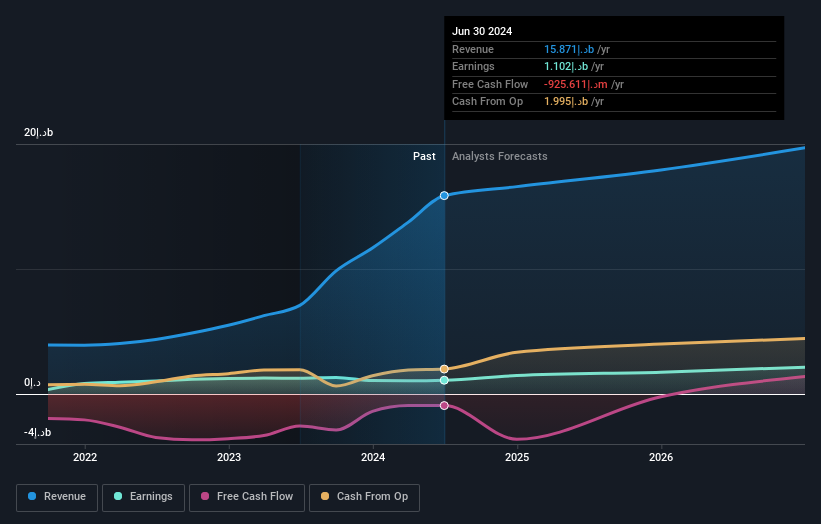Abu Dhabi Ports Company PJSC (ADX:ADPORTS) is largely controlled by institutional shareholders who own 79% of the company
Key Insights
- Significantly high institutional ownership implies Abu Dhabi Ports Company PJSC's stock price is sensitive to their trading actions
- 75% of the company is held by a single shareholder (Abu Dhabi Developmental Holding Company PJSC)
- Analyst forecasts along with ownership data serve to give a strong idea about prospects for a business
To get a sense of who is truly in control of Abu Dhabi Ports Company PJSC (ADX:ADPORTS), it is important to understand the ownership structure of the business. The group holding the most number of shares in the company, around 79% to be precise, is institutions. Put another way, the group faces the maximum upside potential (or downside risk).
Given the vast amount of money and research capacities at their disposal, institutional ownership tends to carry a lot of weight, especially with individual investors. Therefore, a good portion of institutional money invested in the company is usually a huge vote of confidence on its future.
In the chart below, we zoom in on the different ownership groups of Abu Dhabi Ports Company PJSC.
View our latest analysis for Abu Dhabi Ports Company PJSC

What Does The Institutional Ownership Tell Us About Abu Dhabi Ports Company PJSC?
Many institutions measure their performance against an index that approximates the local market. So they usually pay more attention to companies that are included in major indices.
As you can see, institutional investors have a fair amount of stake in Abu Dhabi Ports Company PJSC. This suggests some credibility amongst professional investors. But we can't rely on that fact alone since institutions make bad investments sometimes, just like everyone does. It is not uncommon to see a big share price drop if two large institutional investors try to sell out of a stock at the same time. So it is worth checking the past earnings trajectory of Abu Dhabi Ports Company PJSC, (below). Of course, keep in mind that there are other factors to consider, too.

Institutional investors own over 50% of the company, so together than can probably strongly influence board decisions. Abu Dhabi Ports Company PJSC is not owned by hedge funds. Abu Dhabi Developmental Holding Company PJSC is currently the company's largest shareholder with 75% of shares outstanding. This implies that they have majority interest control of the future of the company. With 7.3% and 2.0% of the shares outstanding respectively, Al Seer Marine Supplies and Equipment Company PJSC and Norges Bank Investment Management are the second and third largest shareholders.
While studying institutional ownership for a company can add value to your research, it is also a good practice to research analyst recommendations to get a deeper understand of a stock's expected performance. There are a reasonable number of analysts covering the stock, so it might be useful to find out their aggregate view on the future.
Insider Ownership Of Abu Dhabi Ports Company PJSC
While the precise definition of an insider can be subjective, almost everyone considers board members to be insiders. Company management run the business, but the CEO will answer to the board, even if he or she is a member of it.
Most consider insider ownership a positive because it can indicate the board is well aligned with other shareholders. However, on some occasions too much power is concentrated within this group.
We note our data does not show any board members holding shares, personally. Not all jurisdictions have the same rules around disclosing insider ownership, and it is possible we have missed something, here. So you can click here learn more about the CEO.
General Public Ownership
The general public, who are usually individual investors, hold a 14% stake in Abu Dhabi Ports Company PJSC. While this group can't necessarily call the shots, it can certainly have a real influence on how the company is run.
Public Company Ownership
It appears to us that public companies own 7.3% of Abu Dhabi Ports Company PJSC. It's hard to say for sure but this suggests they have entwined business interests. This might be a strategic stake, so it's worth watching this space for changes in ownership.
Next Steps:
I find it very interesting to look at who exactly owns a company. But to truly gain insight, we need to consider other information, too. Like risks, for instance. Every company has them, and we've spotted 2 warning signs for Abu Dhabi Ports Company PJSC (of which 1 is a bit unpleasant!) you should know about.
Ultimately the future is most important. You can access this free report on analyst forecasts for the company.
NB: Figures in this article are calculated using data from the last twelve months, which refer to the 12-month period ending on the last date of the month the financial statement is dated. This may not be consistent with full year annual report figures.
Have feedback on this article? Concerned about the content? Get in touch with us directly. Alternatively, email editorial-team (at) simplywallst.com.
This article by Simply Wall St is general in nature. We provide commentary based on historical data and analyst forecasts only using an unbiased methodology and our articles are not intended to be financial advice. It does not constitute a recommendation to buy or sell any stock, and does not take account of your objectives, or your financial situation. We aim to bring you long-term focused analysis driven by fundamental data. Note that our analysis may not factor in the latest price-sensitive company announcements or qualitative material. Simply Wall St has no position in any stocks mentioned.
 Index Options
Index Options CME Group
CME Group Nasdaq
Nasdaq Cboe
Cboe TradingView
TradingView Wall Street Journal
Wall Street Journal